#cw institutionalization
Text
I'm reading an academic article about autism and neurodivergence, and this stopped me dead. What the fuck, what the fuck
"Furthermore, at the time of writing, there is still one facility in the United States (the Judge Rotenberg Center in Massachusetts) that employs electric shock on Autistic people as punishment to enforce neuronormative behaviour, despite an initial ban in 2020 (Young and McMahon, 2021). Given that these residents are among the most vulnerable members of the Autistic population, those who are non-speaking or with high support needs (overlapping but not identical groups), the lack of public will to end this abuse is a significant political and human rights issue."
-- Eleanor Thomas, "Why critical psychology and the neurodiversity movement need each other." Frontiers in Psychology, vol. 15, Jan. 2024.
#cw torture#autism#autistic#nonspeaking autistic#high support needs#neurodiversity#neurodivergent#electric shock#cw medical abuse#cw institutionalization#cw abuse
10 notes
·
View notes
Text
personal post, not a fun read, but I guess it's something my longtime mutuals might want to know. crossposted from my patreon page
When the new year started, I attempted to keep my cool and approach this page professionally again, but life had other plans.
CW: heavy themes concerning mental health and suicidal ideation, psych ward stay.
I honestly do not recall whether or not I shared here about my mental breakdown back in September and October of 2023. Someone really close to me passed, and she was my lifeline, the person I spent years of my life holding on to whenever I wanted to talk myself out of suicide. When she died, I snapped. I asked my mother to drive me to the ER, and the psychiatrist there gave me two options: to be admitted to the psych ward voluntarily, or involuntarily. Thinking back, I now know I didn't really have options, but at the time I thought it was my choice. Anyway.
After a month-long stay, I was released -- and found out I could no longer stay at home. I don't want to go into details here because these are serious issues involving my family and I still haven't forgiven or forgotten things that happened, so I don't want to risk letting the poison seep through my writing and saying things I might regret about people I love.
In the middle of all this, I was let down by close friends too, I ended up sleeping on the cold bare floor for almost a month, my house flooded, I lost over half of my belongings, and had to move to an apartment that is out of my budget at the moment, while dealing with increased responsibilities at work but no increase in pay. I also lost access to private healthcare, and the public healthcare system here is impossible to rely on when you're chronically ill and have such a fun cocktail of mental illnesses and neurodevelopmental disorders as I do.
I am currently on my third month without access to medication I need to function, my apartment is barely habitable, I'm behind at work, my finances are a disaster due to the flood and the aftermath + health issues + living somewhere out of my budget.
I hate talking about this, I feel like I'm sharing a sob story for pity points, but at the same time I can no longer keep this quiet, because the income from your Patreon subscriptions is the difference between being able to afford basic medication and having to go without, and I feel indebted to you. I haven't given up on writing, it's the one thing that keeps me (sort of) sane, but it's not something I have been able to focus on these past few months, and I truly hope you understand just how much I appreciate your continued support. I don't want to make any promises I can't keep. All I can promise is that I'm not giving up.
3 notes
·
View notes
Text
prompt: will finds out why he never met his mom
In canon, Will seems to hold a lot of resentment for his absent mother. I'd love to see a story where he finds out mid-series that she never wanted to leave him but circumstances beyond her control forced her away from him. One possibility is that his mother was institutionalized for schizophrenia (straight up stealing from Criminal Minds here 😂) which could lead to some interesting tension if you wanted to have schizophrenia as an alternative explanation instead of his encephalitis. But that's far from the only possibility.
The key to this prompt is how losing that foundation of his story really sets his self-identity in flux. No longer can he claim that he was unwanted, no longer can he hold onto that brooding resentment like an old crutch. But it still hurts, and now he has no one to blame for the hurting, except maybe his father, but his father was only trying his best to do what he thought was right for Will. So what now? How does he conceptualize the lingering pain he feels if he can't blame anyone for it? And what does it mean for his relationships with other people, especially his relationships with women?
If this happens in season 1, and it's the schizophrenia explanation, there's a lot of opportunity to play with the edges of his sanity, and how it feels to belatedly find out that he was always a ticking time bomb. and the fear of losing himself, not knowing himself, not knowing what's real, etc.
But I'm even more interested in how this would play out if it happened during season 2. Will's doing his whole "fishing" thing with Hannibal, when his dad calls him out of the blue, and comes clean about nearly 40 years of half-truths. And this sudden new information from his personal life takes all the wind out of Will's sails re: catching the Ripper.
Maybe he shows up for his usual session with Hannibal, and Hannibal is smirking, prepared for their usual repartee. But Will just looks at him all bleary-eyed and says in a brittle voice, "Dr. Lecter, I really need you to set everything aside and be my psychiatrist for half an hour. Can you give me that courtesy?"
Hannibal tilts his head, and some of the old person suit slips over his features like a second skin, in a really eerie way that makes Will realize how honest Hannibal has been with him over the last few months. And Hannibal says, "Yes, of course, Will. What would you like to discuss?"
#hannibal tv#will graham#hannibal lecter#cw ableism#schizophrenia mention#cw institutionalization#cw asylum#cw child neglect#cw parent death#cw death mention#angst#hurt/comfort#mommy issues
5 notes
·
View notes
Text
this ep is so problematic and triggering but also a great character study ep
#dfvq liveblog#dfv queue#dfvq spn#spn5x11#cw ableism#cw mental illness#cw institutionalization#cw psychosis#cw psychiatric abuse#cw gaslighting#imagine taking sam seriously as a character#dean studies
0 notes
Text
@babelpuppet
'Combative Patient'. There are words for people like him, an entire fucking word bank of words for people like him as he's learned over the past week, and that's the one they stick to anyone who's justifiably upset with being fucking detained . Combative Patients get Clozapine in the mornings. So do people labelled violent psychopaths.
Hanseok gets good at manipulating the pill with his tongue and quickly stashing it above his gums; the nurses get better at making sure he's not just swallowing water in the morning. Hanseok learns to induce vomiting like the wannabe-idols in the women's ward; his new masters learn to start sending someone to accompany him on the morning bathroom breaks. Corners, corners, corners, constantly backing him into corners. It's infuriating, and the only thing that's kept him from wringing the morning shift charge nurse's fat neck like a fucking pheasant's are the horse tranquilizers they've been shoving down his throat this entire goddamn time. He's smarter than them, stronger, more clever. The only way they can keep him under their thumb is to drug him like a circus animal; the lack of chains is only for optics, no doubt.
He's tired and bored and angry, so, so fucking angry, the only emotion that interrupts the monotony and flatness. There are no visits other than lawyers who talk to him about his coming relocation to the States and the Babel-paid psychiatrist tasked with teaching an utterly disinterested audience of one to act normal and not let the world know - at least until he's informed that at the end of the week his idiot brother will be coming to talk to him for God knows what reason.
Friday comes; he sits at the same kind of table a prison visitation room would have, long arms stretched out on the surface in front of him, hands fiddling with a piece of macrame. At least they don't seem to have many pretenses; the place is a prison and they don't mind pointing that out with the decor.
Hanseo enters the room with that stupid open-mouthed look he always has, the one that makes Hanseok's blood curdle, even now with the dampening of the few things he's still able to feel in earnest. His stepbrother sits.
"Hanseo-ah." He gives his best insincere grin. "Did you miss me? I've been thinking of you." Hanseok opens his hand and slides the unmistakably noose-shaped pantomime of a bracelet in his direction, then adds, as though it not being knit is what will stand out to his visitor, "No sharps on the ward." That you let Dad throw me in, you son of a bitch.
#cw nonconsensual medication#cw institutionalization#cw abuse#BIG unreliable narrator warnings#cw disordered eating mention#CH. jang hanseok
1 note
·
View note
Text
a person my boss had just hired came into work high and bruised up today and my boss is checking in with everyone. im triggered as fuck but when i didnt immediately say i had "been through something like this" before along w my colleagues my boss said that she and I had never been through this before so needed to take a breather. idk how to tell her ive been around high people before without exposing the fact that ive been through psych wards and ers and residentials do to my mental illness history, normally i dont really care abt revealing that information but for some reason im scared of it here, guess its not professional or smth lol.
#i tried to tell her ive been through worse than this but someone spoke over me#and all in all i dont want people's pity#i also hate the way ppl r talking about her.#addiction is a real problem#but its not her fault and she needs help#cw drugs mention#cw institutionalization#vent#dont rb#honestly it just scared the fuck out of me because she seemed to upset and messed up
1 note
·
View note
Text
The hospital I work in really does try hard to make things more tolerable for our autistic patients. It’s never enough. Fix all of the contingent things, and you just bump up against the fact that humans were not designed to live in psychiatric hospitals, autistic humans least of all.
I have met many well-intentioned people who believe that institutions are only bad because of stigma against the mentally ill, or insufficient budgeting, or ignorance of people’s true needs. These people should visit a nursing home someday. The people there don’t have some kind of exotic stigmatized hard-to-understand condition. They’re just old. Yet nursing homes and other institutions for the elderly have every bit as many problems as the institutions for autistic people.
I don’t think that mental health institutions will get better anytime soon, because I would expect the average person to be a lot more concerned with nursing homes – where their grandparents live! Where they themselves will end up one day! – than they are with mental health institutions. If we can’t even get our act together on that one, what hope do we have for the harder problem? Having good involuntary communal living institutions is just plain beyond us as a civilization at this point. It has nothing to do with stigma or prejudice. Even if everybody loved autistic people exactly as much as they love their own grandmother, the best we could hope for is institutions that treat autistic people as well as they treat grandmothers. Which is to say, abysmally.
-Slate Star Codex
121 notes
·
View notes
Text
The degree to which people say bad politics are caused by mental health issues is exhausting. People saying shit like "this person needs to be committed" is so angering. As a psychotic person who experiences delusions hearing people use those words as ad hominem attacks make me feel alienated and gross.
Just STOP, please, mentally ill people, including psychotic people, do not inherently have dangerous politics. We are not the ones doing mass violence, of course, some of us do, but the vast majority of people doing mass violence are not psychotic.
Mentally ill people can be dangerous, have shit politics, and be assholes. But so can people without any severe mental health issues.
Do not throw around the idea of institutionalized people, especially by force, if you don't get the problems mental health hospitals/units have. Do people not seem to understand the dark histories psychiatric facilities had, Not to mention the astonishing degree of violations, ableism, and violence people deemed "crazy" go through in psychiatric hospitals. Yes, we need facilities to give people higher levels of care. But being held against your will is traumatic. Being in underfunded/understaffed/under-regulated facilities is traumatic AF.
People who hear voices, people with dissociative disorders, delusional people, people with compulsions and all others considered crazy are not the real problem.
#our post#psychosis#ableism#saneism#delusions#institutionalization#forced hospilization cw#politics#OSDD#DID#actuallypsychotic
161 notes
·
View notes
Text
you know, if the writers really wanted black manta to have a redemption arc, they could have chosen literally any strategy besides "earlier black manta was evil (autistic) and confused so he did bad stuff, and now he's good (autism cured) and not confused and an aquaman ally"
like! It would be extremely confusing to grow up in an asylum and subject to medical abuse your whole life! But also you don't have to change his neurotype if you want him to be good now!
22 notes
·
View notes
Text
I wanted to share some articles on actual 19th century asylums. I did some research because I wanted to see if Seward’s actions were actually the standard of care at the time and what reformers of the era were actually pushing for.
And what I discovered is that there were quite a few asylums that were more considerably more progressive and were far more humane than Seward’s asylum. Some even had practices that looked very similar to the restraint reduction/elimination programs we see today. Some had even eliminated mechanical restraints (straight jackets, chains, etc.) entirely.
So people were actually aware of how cruel and unnecessary many of these practices were. Hanwell Asylum phased out mechanical restraints like these in the 1840s. They created an environment where patients could move freely, focused on vocational programs (though many of these were unpaid) and even made deescalating patients in crisis (as opposed to using restraints) a core part of their practice.
https://www.sciencemuseum.org.uk/objects-and-stories/medicine/victorian-mental-asylum
People were also actively protesting the inhuman conditions at many asylums.
https://www.historyhit.com/life-in-a-victorian-mental-asylum/
Not every asylum was like this, but the idea that mechanical restraints where not necessary was in the public conciseness, and psychiatric care that focuses on managing environments and stimulus/triggers was actually a thing that existed.
One of the reasons mechanical restraints returned and the concept of patient dignity became less a focus was overcrowding in the late 19th century This is the same issue that modern institutions cited as the cause for horrific drops in quality of care and abuse. Like today, the worst places were those where people were warehoused without enough staff to adequately supervise them. You saw this in places like Bethlam Royal Hospital (aka Bedlam Asylum).
High staff ratio was seen as essential to restraint reduction in places like Hanwell, much like today. This is very similar to how programs for people with intellectual disabilities and mental illness that lead to physical behaviors/aggression are placed in environments with high staff-to-client ratios (or even 1-to-1 staff) in order to have people on hand to give them more individual attention while in crisis and focus on de-escalation (I worked in contemporary programs that provided this kind care of for about 4 years).
So when we talk about Seward as a product of his time, I think we need to acknowledge that there were a lot of places that phased out the practices he uses on Renfield, some of which predated Dracula by almost a century.
Seward’s actions need to be looked at less in light of the standards of the time and more in light of Stoker’s own ableist and eugenicist beliefs. You see time and time again that Stoker equates mental health with moral and religious failings and a person being a lower form of human being. Notice how Seward continually frames the worst parts of Renfield’s mental illness in the context of scripture.
This was well after psychiatric science had begun to move away from this idea (though anyone with mental illness who grew up in a conservative Christian comunity will tell you it hasn’t faded completely today). Hanwell doctors did believe that religion played a role in a patient’s recovery, but less in the idea that mental illness/moral failing was linked inherently to a biological difference that was not treatable.
Later in the book, Stoker writes a scene were Van Helsing talks about how criminals have “childlike brains” and very much equate things like mental illness and intellectual disabilities with criminality. Though he does seem to make an exception for conditions like dementia (it is implied at one point that VH’s wife is suffering from it). In general, the characters in Dracula believe that mental illness/mental defects are inherent. This is why you see Seward focus more on studying Renfield than curing him.
So Seward and his asylum really are more emblematic of Stoker’s biases than they were the more progressive and compassionate practices toward treating mental illness that very much existed at the time. Critiquing his character for his treatment of Renfield is absolutely valid. He uses practices that asylums predating him by over 50 years deemed cruel and obsolete. Those practices has not vanished but we’re more associated with county institutions that warehoused their patients rather than private practices like Sewards.
373 notes
·
View notes
Text

Wednesday (Quadruple) Drabble: The Lost and Found
She had been lost before.
Moving as a child from the Illyrian side of the city to the non-Illyrian side, hope for increased safety as consolation for leaving a part of her identity behind.
He had been lost before.
Refusals overridden, his would-be captors gaining control of his computer to falsify assent for a descent into fantasy, life in unreality as corrosive as the battery acid that powered his radiation-damaged heart.
Starbase records made clear Spock’s betrayal and, once Una reached Talos IV, it didn’t take long to locate Chris— his illusion screaming in pain from fire-borne punishment, his true form immobilized in his support chair.
The rage she needed to defeat Talosian mind control came easy.
In the shuttle she’d… procured… Chris declined her algorithm to match his speaking voice, choosing instead to use a computer default, no intonation of anguish or joy, no movement in his scarred face or change to his mechanized, steady respiration as he answered her questions.
“My best guess is Spock exploited that you’d be away from Starbase Eleven for a few weeks. He knew he was disobeying my orders and committing mutiny. He did it anyway.”
“If the Illyrian doctor is willing to try, I understand the risks.”
“Leave Vina behind. She made her alliances clear.”
So it’s at an Illyrian colony far from Federation arrogance or authority that his DNA unfurls and re-forms. Genetic engineering is usually performed before birth, but this is his rebirth, no longer the Christopher Pike who upheld Starfleet ideals but a Christopher Pike who is wary of a Starfleet that would tolerate a sham court martial rather than search for a greater truth.
Is Una reborn, too? Her belief in something greater than herself, in a Starfleet that could, in fact, become what she had hoped it to be in her idealistic younger years, that belief is withered, gone, replaced by allegiance to people, not an organization.
His skin is pockmarked, his voice reedy, gait unsteady. Genetic engineering isn’t a miracle cure.
Her sense of purpose has telescoped from appreciation for differences to appreciation for those who share her values.
Are they still lost?
Isn’t everyone?
But to be lost together… a shuttle course laid in toward a curious-looking cluster of stars, his hand a comfort on her shoulder, her soft hum the music of his naturally-beating heart… to be lost together… is something like being found.
•
Christopher Pike drabbles: 3, 2, 1/?
#wednesday drabble#can’t tag wednesday100 with a quad though#christopher pike#una chin riley#pikeuna#pikeone#pikeuna fanfic#pikeone fanfic#star trek strange new worlds#star trek the original series#cw upcoming rant in tags#if anyone wants to debate spock with me please first do me the favor of revisiting the menagerie with current standards of consent in mind#chris’ no no no no no no no breaks my heart#not to mention chris’ vote to have spock found guilty of mutiny for what spock was trying to do#but whoops the whole court martial was a sham#and increasing talosian control over computer systems lends doubt to chris’ last effort to communicate using his chair#to cast someone out of reality is among the cruelest things i can imagine#though it certainly tracks with 1960s views on institutionism
14 notes
·
View notes
Text
Sunless Lives Part 25: I Will Wait
~1580 words
CW: drugging, noncon undressing, nonsexual nudity, noncon touch, medical whump, forced institutionalization, ED mention, negative self-talk
First, Previous, Next, Masterlist
~~~
DR MANDAL: I’d like to know how you like the staff and faculty here so far.
M BECK: Oh, they’re great. Everyone’s been wonderful.
DR MANDAL: No trouble at all?
M BECK: None.
DR MANDAL: That’s good to hear. What about the other patients, do you like your roommates?
M BECK: Sure, they’re alright.
DR MANDAL: No issues?
M BECK: We all wake up with nightmares, so it’s not like it’s fair to complain about that.
DR MANDAL: So no issues, but do you like them?
M BECK: I think so. I think everyone here hates themselves so much, it’s hard to connect with other people.
DR MANDAL: That’s very observant. Would you include yourself in that?
[0:26]
M BECK: Yeah.
~~~
The intake process was terrifying. Whatever drugs he’d been given had worn off enough for Simon to be awake, but not enough for him to resist as he was manhandled by orderlies out of the car and into a hulking rock of a building - the title of Fort wasn’t just for show. He didn’t have much time to look before he was inside, lifted onto a gurney and wheeled through a dizzying maze of hallways and into a cold room. Broad-shouldered orderlies leaned over him, and started taking off his clothes. One unzipped his coat, while another sat him up. The coat was jerked over his shoulders and off, and dropped unceremoniously on the floor. Then his turtleneck was peeled off, his arms gripped and guided by strong hands. He whimpered and flinched when they touched his skin directly for the first time, and he distantly registered a laugh. His upper half was dropped back onto the gurney and they set to work on his lower half. Someone pulled off his boots and socks while someone else started unbuttoning his jeans. This sent a shock of panic through Simon, he wanted to tell them to stop, but he couldn’t form the words. He couldn’t form coherent thoughts either, instead his head was overtaken by wordless waves of fear and shame and embarrassment as they pulled his pants and underwear down. A hand briefly grabbed his ass but Simon couldn’t tell if it was on purpose or not. Tears slipped out and ran down his temple and into his ear. He couldn’t even move to brush them away, much less stop anything that was happening. Someone whistled when his thighs were revealed.
“Bloodbag.”
“Yup.”
“Fuckin’ idiot.”
A vague figure ran a hand over his ribs.
“ED watch?”
“Probably.”
“I’ll be deciding that.”
The orderlies backed off, and a gray-haired man in a doctor’s coat took over, briskly taking Simon’s vitals and shining lights in his eyes, ears, and mouth. He manually pulled at Simon’s eyelids and jaw himself, and didn’t address Simon as he worked. Then, Simon could only lie there and watch as the worst happened: the doctor received a camera from an orderly and started taking pictures. His face. His scars. The bites. The flash of the camera left Simon blinded and dazed. The doctor barked at the orderlies to flip him over and Simon heard the camera click as he captured his backside as well. Then he was dropped onto his back again, a sheet was thrown over his lower half, and the room was suddenly quiet and empty.
His head flopped to the side on the thin padding of the gurney, mouth agape. Tears and drool slowly leaked out, out of his control. He felt disgusting. Violated. Scared. This had to be some sort of mistake. There was no way Chris would send him to someplace like this. Your boss and your friends were so very worried, Kelly had said - Gina, Amber, and Devon had had a hand in this as well. He needed to talk to Chris. This all had to be some horrible misunderstanding. It had to be.
He wanted Matthew.
He wanted to go home.
Maybe you made a mistake.
Simon drifted in and out of consciousness for a while, but was finally brought back by his stomach growling loudly. He’d lost a lot of his appetite over the last month, but even he could only go so long without eating. He found he could move his arms, and legs, and even slowly sit up. He discovered some thin, scratchy clothes folded at his feet: a long sleeved t-shirt and elastic-waisted pants, both a sickly shade of green, and started the laborious process of putting them on. He felt sick, dizzy, cold, and hungry, and his limbs moved half a second slower than he wanted them to. He had just pulled up the pants and was standing unsteadily against the gurney when the door opened. He flinched back, grabbing the gurney for support. The large redheaded orderly that entered looked him up and down.
“McKenna?”
“Yes?” Simon breathed.
“With me.” He stepped aside and held the door open. Simon tentatively scooted through under his gaze.
“Where-?”
“Left,” the man ordered.
Simon started walking to the left down the hall, but his legs wobbled under him and he staggered into the wall. The large man caught his upper arm, gripping it hard enough to bruise, and dragged him along.
“That hurts, you’re hurting me,” Simon pleaded. No response. “Where are we going?” Nothing. They passed by more doors and under more fluorescent lights, as well as beady-eyed cameras mounted in high corners. The surveillance reminded Simon of Lara’s house, and his heart pounded. He stumbled to keep up. “I haven’t had anything to eat since yesterday, can -”
The orderly abruptly stopped and slammed Simon into the wall, pinning him there with an arm across his chest that knocked all the air out of Simon’s lungs.
“Don’t ask me for shit,” he growled, “Don’t ask anyone for shit, just do what you’re told, and shut the fuck up.”
Simon nodded, gasping for air. The orderly held him there for a long, threatening moment, clearly enjoying the power trip. Then it was back to being dragged.
After a few more confusing turns, they passed through a heavy security door and into an open room with round tables and scattered chairs, occupied by a handful of other people in the same green outfits as Simon. Orderlies were dotted around the room, observing as patients drew in coloring books and played checkers. It reeked of mildew and sick. Cameras stared from every corner.
“Don’t make any friends,” the redhead whispered in his ear, and released his arm. Simon staggered a couple steps forward, clutching at his aching bicep. Some of the other patients turned in their seats to watch him with languid curiosity.
Simon hugged himself tightly, breathing fast. He didn’t know what the orderly’s warning meant. He didn’t know what to do. He looked around the room in desperation and his heart leapt when he saw the back of someone in pink scrubs - a nurse, not a patient or orderly. The pink reminded him of Tammy at the clinic, and how kind she’d been. He wove through the tables to where she was talking to another patient.
“Excuse me,” Simon tapped her on the shoulder, “I just got here, I don’t know what’s going on, can you help me?”
She turned around slowly, her thin eyebrows high.
“Okay, number one, do not touch the faculty or staff,” she lectured.
“Oh, sorry, I -”
She snapped her hand closed in front of his face.
“Ah-ah! I don’t want to hear it. Who did your intake?”
“I didn’t - I don’t know.”
“You don’t know? Do you know your room number?”
“N-no.”
She huffed.
“Fine, I’ll look everything up for you. What’s your name, do you at least know that?”
“Simon. McKenna.”
“Thank you.” She strode away, ponytail bouncing, and exited through a security door that she opened with a keycard. Simon watched her go, pressing his knuckles to his mouth.
“That’s Linda,” said the patient she had been talking with - a very tall, very skinny man hunched over a hand of cards. Two others sat opposite him, an older man with a significant tremor and a boy younger than Simon, barely an adult.
“You don’t want to mess with her. I’m Chett, you wanna play cards with us?” the skinny man twanged, and grinned black and yellow teeth in an eerily familiar way that made Simon shrink back.
“S-sorry, no thank you,” he stammered.
“C’mon, sweet little thing like you needs friends!” Chett cajoled, but Simon was already backing away. He found a mercifully empty table and slouched down in the slippery plastic chair to wait for Linda. His heart thrummed and his eyes darted around the room at the other patients still giving him sidelong glances. None of them looked particularly friendly. The orderlies, on the other hand, looked downright hostile. They were all large men, some even larger than Matthew, and they glowered down over the patients like a bank of storm clouds.
Matthew. Simon felt tears spring to his eyes again. Hopefully wherever Matthew was sent was better than this. He put his head down on the table, sheltering under his arms. His mind replayed his last moments with Matthew. Their last kiss.
I’ll come get you.
Only a little while.
It’ll be okay.
You fucking idiot.
Regret started to bubble up in his stomach.
Shouldn’t have gone to the clinic.
He winced at the thought. Matthew, the real Matthew, was back and alive, and he was regretting that?
Worthless.
You deserve to be here.
~~~
First, Previous, Next, Masterlist
Taglist: @flowersarefreetherapy, @pigeonwhumps, @sunshiline-writes, @seasaltandcopper
#whump#whump fic#whump writing#sunless lives#sunless lives arc 3#cw drugging#cw noncon undressing#cw nonsexual nudity#cw noncon touch#medical whump#cw forced institutionalization#cw ED mention#cw negative self-talk#my writing
23 notes
·
View notes
Photo
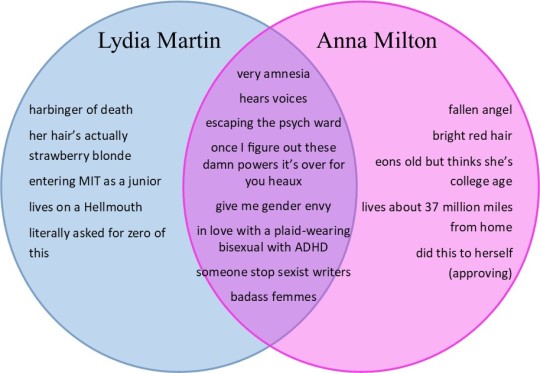
I don’t know what this is, Anna’s intro just felt very Lydia-coded but then I remembered it’s the other way around
#dfvq liveblog#dfv queue#dfvq spn#dfvq tw#lydia martin#anna milton#spn4x9#femme studies#why would they fight they're girlfriends#rarepair demon#cw misogyny#cw mental illness#cw institutionalization
0 notes
Text
i feel like i see the thing relatively often where someone will say that ed's not actually that mentally ill, fans are just racist and also somehow this is izzy's fault because the only time he shows symptoms of mental illness is through izzy supposedly. even though in episode four alone we see him talk about suicide ideation, how discontent he is in life, and how burnt out he is.
but when people urge others to add an antiracist lens to their analysis and point out the historical racism within the psychiatric system it seems like?? they think that the only explanation is for ed to just be a lil depressed and that poc who are otherwise perfectly fine are constantly being slapped with extreme diagnoses. which, that is a thing that happens btw. people will call the cops on and forcefully institutionalize black folks who they have disagreements with and weaponize psychiatry against them.
that said, when talking about something like the uneven diagnosis distribution between poc and white people of schizophrenia (since that's something that's been researched) it's not that doctors are talking people who are otherwise perfectly mentally healthy and attributing their behavior to mental illness (although again it does happen.) usually though what people are referring to is how doctors are quick to diagnose poc with schizophrenia before doing their proper diligence and going over the other possibilities including histories of depression, trauma, and abuse. certain traits they exhibit are overemphasized and others minimized or ignored. a black person and white person may show the same exact symptoms, but the doctor will first have the white person tested for PTSD or BPD and try alternative treatment plans, while marking the black person off before considering other possibilities.
it's dangerous and disturbing where poc will be put through a series of medications that do not help, receive no treatment for the actual root of the problem, and then in the process often be criminalized as well since there is a much greater social stigma and forced state control over people diagnosed with schizophrenia.
i just feel like if you're gonna talk about ed and misdiagnosis through a racial lens, it'd be more accurate for him to immediately get diagnosed with something like schizophrenia without the doctor doing anything more to look into him. ignoring things like his history of child abuse and how trauma can cause certain responses. or for something he said metaphorically to be taken as literal where he might describe himself when angry as "the kraken" and the doctor marks that down as a sign of delusions. overemphasizing verbal expressions of angers as signs of violence. hearing ed say "it feels like my boss is out to get me" where he means that the boss keeps picking on him and it feels racially motivated, and the doctor puts on the record that he suffers from paranoia.
also just saying but there is actually a LOT out there you can read about māori mental health and the issues surrounding NZ's system. about 1 in 3 māori adults meet criteria for a mental disorder and this is a result of a racist health system, poverty, and, very importantly, colonialism. but like? i promise you don't need to create your own theories on how ed's identity interacts with mental health as if you're the first person to considered that. kaupapa māori mental health services are literal resources in place to address māori mental health needs within a cultural context. like! it's very cool actually for these things to be made available through hard community work that rejects colonialist psychiatric systems and instead utilizes a holistic and indigenous approach to wellness.
idk it's just so much more complicated than ignoring ed's very real mental illness and writing it off as no biggie. tbh it feels very um american centric as well to make assertions about relationships to mental health and race without ever acknowledging the specific community history here and that this isn't a new conversation. if you want to say you're examining ed through an anticolonialist framework then it would help if you did literally any work to find out what that looks like currently.
#ofmd#psychiatric abuse cw#institutionalization cw#edward teach#that tag is for me to find this later if i need
49 notes
·
View notes
Text
the only person in Emma Frost's family that she knew loved her and would do anything for her was Christian, her older brother.

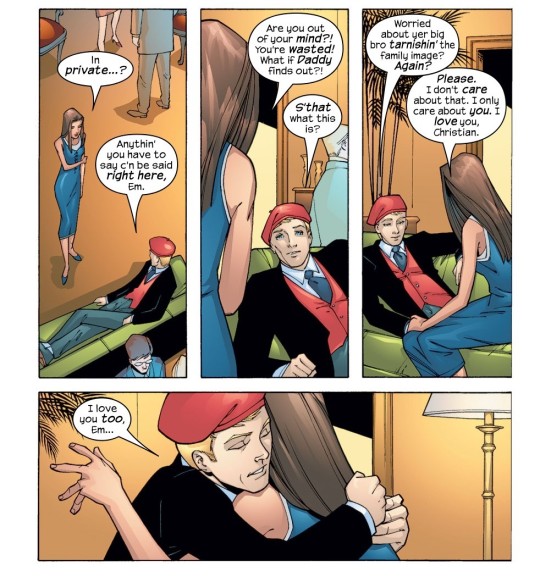
he was also gay and their father was openly homophobic, Christian attempted suicide and became addicted to drugs.
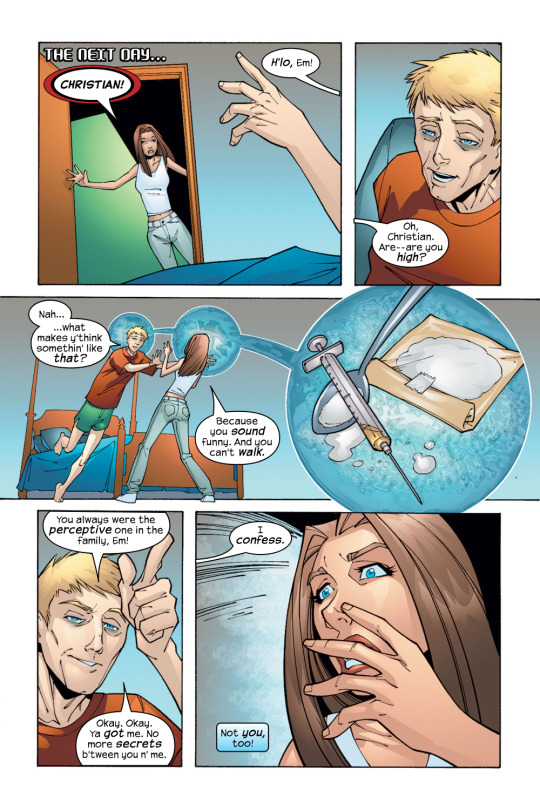

& was put in an institution for most of his life after Emma told her father she had concerns with Christian's drinking/drug use


-from Emma Frost #6
he reappears in Iceman #2, 2018, Emma's recap of events:

I really encourage people to read this issue, because it's amazing, & heartbreaking obviously.


"when they kept giving me pills. when they starved the gay out of me...Where were you?!"
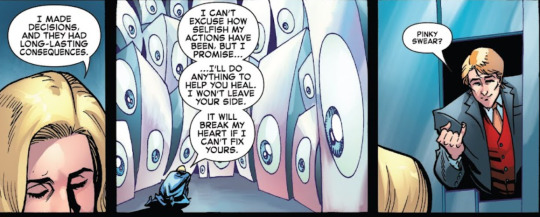
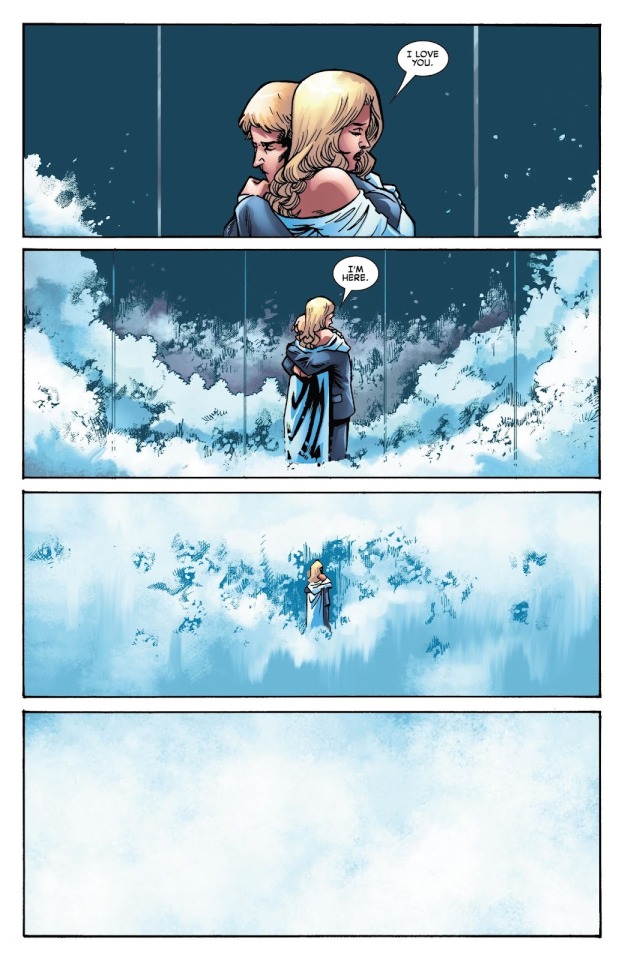
#suicide cw#institutionalization cw#christian frost#emma frost#my favorite part is how he killed their abusive father < 33#abuse cw
17 notes
·
View notes
Text
Poison Ivy #19-21
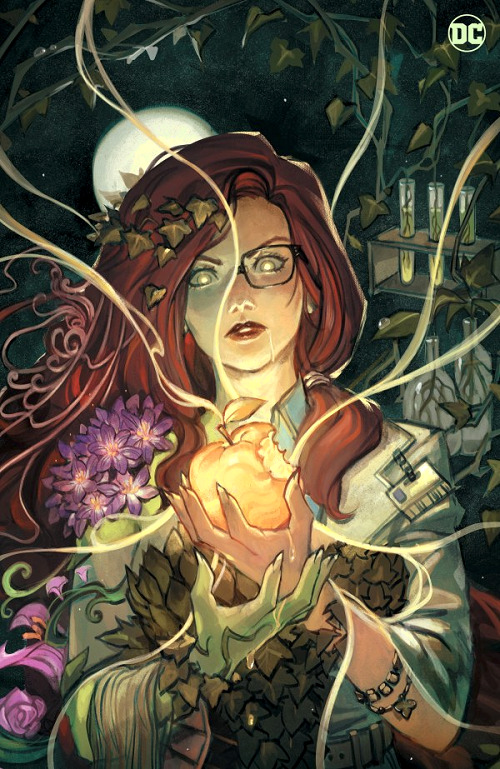
Checking in with the Poison Ivy comic series again, we’ve reached a set of trio issues #19-21 forming “Origin of Species”. This writer G. Willow Wilson’s efforts in marrying together the contributions by many creatives over decades who have taken on the matter of Poison Ivy’s origins. Which if that sounds ambitious, you’d be right.
In media Ivy’s origins have often been recounted either by others or herself. However, because of the developments that led here in previous issues, this secret origin is too for all ones knows a last testament. With that frame dare readers hope for a more sapient, innermost version?
To begin issue #19 sees Pamela Isley off to a Seattle university as an undergraduate in a plant biochemistry program fatefully headed by Dr. Jason Woodrue. Wanting to best her peers (leading botanists Alec and Linda Holland plus Philip Sylvain), entranced both by the work and Woodrue, falling for a sexual relationship with him among other manipulations. When the next round of funding for the experiments runs out, Pam makes her first foray into crime.
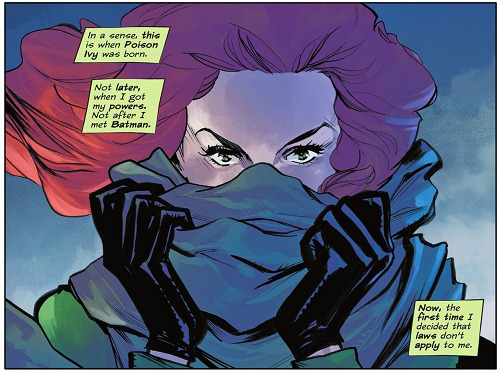
Next for issue #20, as things with Pam and Woodrue continue to escalate, Wilson once more does not forget a relatively recent character in the schemes of things… Bella Garten.
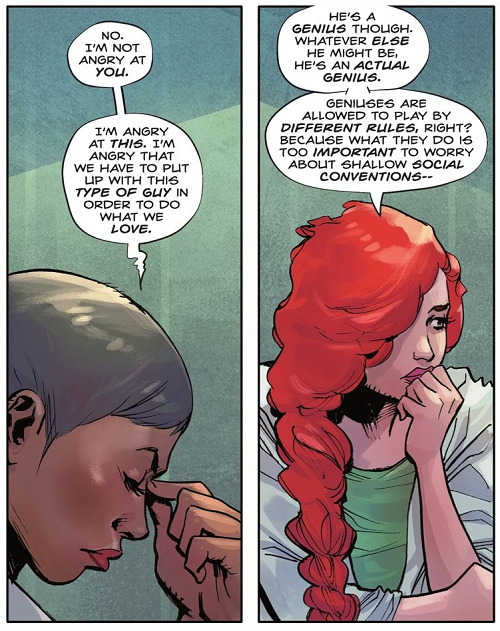
Her last appearance to this in a flashback in #2, it’s been several issues. So, let’s take a minute to discuss Bella.
As a fellow student and love interest, specializing in botany and genetics going on to earn a doctorate, Bella Garten or the The Gardener as she would become first appeared in Batman #107 in 2021 creation of writer James Tynion IV. Plus, part of the thread of story involving Poison Ivy during the Fear State event and into the past. The one-shot Batman Secret Files: The Gardener (written by Tynion and art by Christian Ward) was also included in the first collected edition of Poison Ivy. However, the file, another secret origin comic is less about Bella Garten and more an attempt to appeal to Batman to help Ivy (around the Tom King Everyone Loves Ivy period) running through decades of Ivy’s character (with adjustments). Part of the history there exposed, particularly certain actions of Gardener, is uncomfortably weird.

Yet again an example of major violation done to Ivy by someone she trusted. The revelation resulting in a short confrontation between the two in Fear State Omega. (The issue also marking the end of Tynion’s Batman run with Art: Riccardo Federici, Christian Duce, Ryan Benjamin, Guillem March & Trevor Hairsine, Colorist: Chris Sotomayor and Letterer: Clayton Cowles). Where Ivy is having none of the presented defense.
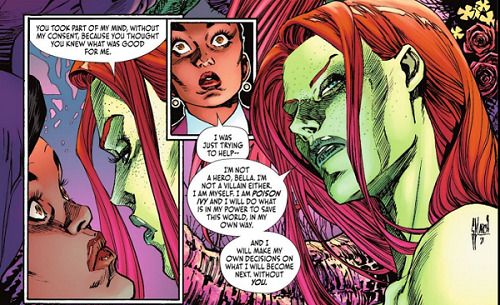
In sum a character that functions more as a plot point, another retcon while trying to put it all (back) together. Yet, coherency that has been needed. Despite the American superhero genre (in)famously being one where seemingly everything and nothing is canon, something still important. So too, the first ongoing series for Poison Ivy not just ought to but, does endeavor to plumb over 50 years of a character’s existence. While bringing what each creative uniquely can. It’s worth asking then if Bella is made more too under Willow’s writing.

Wrapping up casting Ivy’s mind back, issue #21 arrives at the full Poison Ivy. Once again, becoming a human experiment (volunteering!) and transformation. An old life lost, the new leading to Gotham— yet for a unique green reason.
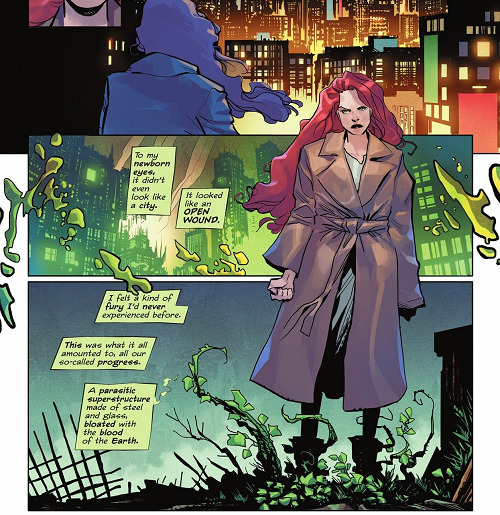
As a woman with growing abilities, confidence in using them, the law is just an obstacle to justice. But of course, conflict and differences plus mistrust with Batman result with Ivy in and out of the terrible Arkham Asylum. This would be the early pre-Harley days too, even though the Ivy costume calls back to the influential BTAS.

Then what can I say about the art I’ve haven’t already in other reviews. Jessica Fong continues to deliver pretty and pretty gross (body) horror main covers. (On the latter it took a while to prepare myself to read the previous issue #18. Though it’s not shocking that bodily autonomy, something Ivy’s origins raise too, makes the list of also current matters the series depicts.)
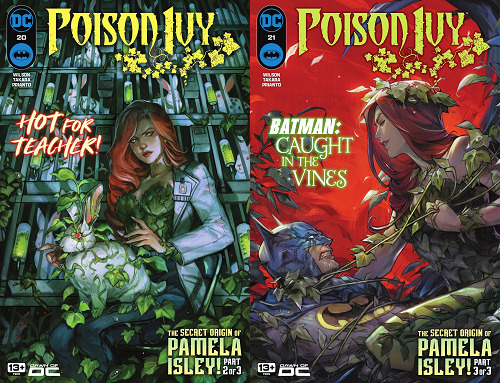
Marcio Takara definitely has set a bar as the main artist for the series. I wish he was drawing every issue. Though nothing against the other artists who have so far done so. It’s just that I generally wish for a creative team to be able to remain consistent through a run. I’ve praised colorist Arif Prianto consistently too. On the other hand, since these installments are Ivy believing she’s dying and mired in her distant past, I’m surprised there isn’t more of a difference exhibited of that. Why not really experiment with the paneling, designs, and color palette. Just as key the letterer Hassan Otsmane-Elhaou can switch things up to good effect. Actually, if part of the team working on Poison Ivy had to change briefly maybe here was where to do that instead.
In the end these issues of the comic series offer an origin stressing the choices and chances. A Poison Ivy that refutes being pathologized, focuses less on victimization, and more of her own creation and missteps along the way. It’s interesting too, if not still poignant, to look back to the first few issues of Poison Ivy. In soon coming up on two years, the series has issue by issue after issue grown and been recognized as an Outstanding Comic Book by GLAAD. After reflecting on a new(ish) past it continues forward.
#poison ivy#dc comics#G Willow Wilson#Marcio Takara#Arif Prianto#Hassan Otsmane-Elhaou#Jessica Fong#long post#cw: toxic relationship verbal abuse medical experimentation forced institutionalization
4 notes
·
View notes